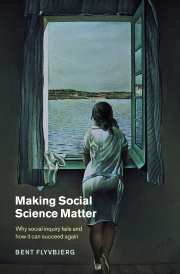Book contents
- Frontmatter
- Contents
- Acknowledgments
- 1 The Science Wars: a way out
- Part one Why social science has failed as science
- Part two How social science can matter again
- 5 Values in social and political inquiry
- 6 The power of example
- 7 The significance of conflict and power to social science
- 8 Empowering Aristotle
- 9 Methodological guidelines for a reformed social science
- 10 Examples and illustrations: narratives of value and power
- 11 Social science that matters
- Notes
- Index
11 - Social science that matters
from Part two - How social science can matter again
Published online by Cambridge University Press: 05 June 2012
- Frontmatter
- Contents
- Acknowledgments
- 1 The Science Wars: a way out
- Part one Why social science has failed as science
- Part two How social science can matter again
- 5 Values in social and political inquiry
- 6 The power of example
- 7 The significance of conflict and power to social science
- 8 Empowering Aristotle
- 9 Methodological guidelines for a reformed social science
- 10 Examples and illustrations: narratives of value and power
- 11 Social science that matters
- Notes
- Index
Summary
Indeed he knows not how to know who knows not also how to un-know.
Richard Francis BurtonIf we want to re-enchant and empower social science, and if we want to recover social science from its current role as loser in the Science Wars, then we need to do three things. First, we must drop the fruitless efforts to emulate natural science's success in producing cumulative and predictive theory; this approach simply does not work in social science. Second, we must take up problems that matter to the local, national, and global communities in which we live, and we must do it in ways that matter; we must focus on issues of values and power like great social scientists have advocated from Aristotle and Machiavelli to Max Weber and Pierre Bourdieu. Finally, we must effectively communicate the results of our research to fellow citizens. If we do this, we may successfully transform social science from what is fast becoming a sterile academic activity, which is undertaken mostly for its own sake and in increasing isolation from a society on which it has little effect and from which it gets little appreciation. We may transform social science to an activity done in public for the public, sometimes to clarify, sometimes to intervene, sometimes to generate new perspectives, and always to serve as eyes and ears in our ongoing efforts at understanding the present and deliberating about the future. We may, in short, arrive at a social science that matters.
- Type
- Chapter
- Information
- Making Social Science MatterWhy Social Inquiry Fails and How it Can Succeed Again, pp. 166 - 168Publisher: Cambridge University PressPrint publication year: 2001
- 1
- Cited by



